- Home
- Kim Newman
Anno Dracula ad-1
Anno Dracula ad-1 Read online
Anno Dracula
( Anno Dracula - 1 )
Kim Newman
It is 1888 and Queen Victoria has remarried, taking as her new consort Vlad Tepes, the Wallachian Prince infamously known as Count Dracula. Peppered with familiar characters from Victorian history and fiction, the novel follows vampire Geneviève Dieudonné and Charles Beauregard of the Diogenes Club as they strive to solve the mystery of the Ripper murders.
Anno Dracula is a rich and panoramic tale, combining horror, politics, mystery and romance to create a unique and compelling alternate history. Acclaimed novelist Kim Newman explores the darkest depths of a reinvented Victorian London.
Praise for Anno Dracula:
“Kim Newman’s Anno Dracula is back in print, and we must celebrate. It was the first mash-up of literature, history and vampires, and now, in a world in which vampires are everywhere, it’s still the best, and its bite is just as sharp. Compulsory reading, commentary, and mindgame: glorious.”
— Neil Gaiman
“Anno Dracula couldn’t be more fun if Bram Stoker had scripted it for Hammer. It’s a beautifully constructed Gothic epic that knocks almost every other vampire novel out for the count.”
— Christopher Fowler
“Bloody excellent. Kim Newman has exsanguinated the best of fact and fiction and created a vivid vampirous Victorian world uniquely his own. This clever, delicious extravaganza – Hammer Horror meets True (Blue) Blood – is just the tonic for the year of a Royal Wedding.” — Stephen Volk
“Anno Dracula is the smart, hip Year Zero of the vampire genre’s ongoing revolution.” — Paul McAuley
“A brilliantly witty parallel-world saga... builds sure-footedly to a bravura climax which entirely redefines ‘Victorian values’.”
— Daily Telegraph
“A tour de force which succeeds brilliantly.” — The Times
“A marvellous marriage of political satire, melodramatic intrigue, gothic horror and alternative history. Not to be missed.”
— The Independent
“The most comprehensive, brilliant, dazzlingly audacious vampire novel to date. ‘Ultimate’ seems an apt description... Anno Dracula is at once playful, horrific, intelligent and revelatory... Newman’s prose will remain gloriously unique.” — Locus
COMING SOON:
ANNO DRACULA: THE BLOODY RED BARON
ANNO DRACULA: DRACULA CHA CHA CHA
ANNO DRACULA: JOHNNY ALUCARD
For Steve Jones, the Mammoth Bookkeeper of Vampires
‘We Szekeleys have a right to be proud, for in our veins flows the blood of many brave races who fought as the lion fights, for lordship. Here, in the whirlpool of European races, the Ugric tribe bore down from Iceland and the fighting spirit which Thor and Wodin gave them, which their Berserkers displayed to such fell intent on the seaboards of Europe, ay, and of Asia and Africa too, till the peoples thought that the were-wolves themselves had come. Here, too, when they came, they fought the Huns, whose warlike fury had swept the earth like a living flame, till the dying peoples held that in their veins ran the blood of those old witches, who, expelled from Scythia had mated with the devils in the desert. Fools, fools! What devil or what witch was ever so great as Attila, whose blood is in these veins? Is it a wonder that we were a conquering race; that we were proud; that when the Magyar, the Lombard, the Avar, the Bulgar, or the Turk poured his thousands on our frontiers, we drove them back? Is it strange that when Arpad and his legions swept through the Hungarian fatherland, he found us here when he reached the frontier? And when the Hungarian flood swept eastward, the Szekeleys were claimed as kindred by the victorious Magyars, and to us for centuries was trusted the guarding of the frontier of Turkey-land; ay and more than that, endless duty of the frontier guard, for, as the Turks say, “water sleeps, and enemy is sleepless”. Who more gladly than we throughout the Four Nations received the “bloody sword”, or at its warlike call flocked quicker to the standard of the King? When was redeemed that great shame of my nation, the shame of Cassova, when the flags of the Wallach and the Magyar went down beneath the Crescent, who was it but one of my own race who as Voivode crossed the Danube and beat the Turk on his own ground? This was a Dracula indeed! Woe was it that his own unworthy brother, when he had fallen, sold his people to the Turk and brought the shame of slavery upon them!... Again, when, after the battle of Mohacs, we threw off the Hungarian yoke, we of the Dracula blood were amongst their leaders, for our spirit would not brook that we were not free. Ah, young sir, the Szekeleys – and the Dracula as their heart’s blood, their brains and their swords – can boast a record that mushroom growths like the Hapsburgs and the Romanoffs can never reach. The warlike days are over. Blood is too precious a thing in these days of dishonourable peace; and the glories of the great races are as a tale that is told.’
Count Dracula
‘I have studied, over and over again since they came into my hands, all the papers relating to this monster; and the more I have studied, the greater seems the necessity to utterly stamp him out. All through there are signs of his advance; not only of his power, but of his knowledge of it. As I learned, from the researches of my friend Arminius of Buda-Pesth, he was in life a most wonderful man. Soldier, statesman and alchemist – which latter was the highest development of the science-knowledge of his time. He had a mighty brain, a learning beyond compare, and a heart that knew no fear and no remorse. He dared even to attend the Scholomance, and there was no branch of knowledge of his time that he did not essay. Well, in him the brain powers survived the physical death; though it would seem that memory was not all complete. In some faculties of mind he has been, and is, only a child; but he is growing, and some things that were childish at the first are now of man’s stature. He is experimenting, and doing it well; and if it had not been that we have crossed his path he would be yet – he may yet be if we fail – the father or furtherer of a new order of beings, whose road must lead through Death, not Life.’
Dr Abraham Van Helsing
1
IN THE FOG
Dr Seward’s Diary (kept in phonograph)
17 SEPTEMBER.
Last night’s delivery was easier than the others. Much easier than last week’s. Perhaps, with practice and patience, everything becomes easier. If never easy. Never... easy.
I am sorry: it is difficult to maintain an orderly mind and this marvellous apparatus is unforgiving. I cannot ink over hasty words or tear loose a spoiled page. The cylinder revolves, the needle etches, and my ramblings are graven for all time in merciless wax. Marvellous apparatuses, like miracle cures, are beset with unpredictable side-effects. In the twentieth century, new means of setting down human thought may precipitate an avalanche of worthless digression. Brevis esse laboro, as Horace would have it. I know how to present a case history. This will be of interest to posterity. For now, I work in camera and secrete the cylinders with what remain of my earlier accounts. As the situation stands, my life and liberty would be endangered were these journals exposed to the public ear. One day, I should wish my motives and methods made known and clear.
Very well.
The subject: female, apparently in her twenties. Recently dead, I should say. Profession: obvious. Location: Chicksand Street. The Brick Lane end, opposite Flower & Dean Street. Time: shortly after five ante meridiem.
I had been wandering for upwards of an hour in fog as thick as spoiled milk. Fog is best for my night-work. The less one can see of what the city has become in this year, the better. Like many, I’ve taken to sleeping by day, working by night. Mostly, I doze; it seems years since the bliss of actual sleep. Hours of darkness are the hours of activity now. Of course, here in Whitechapel things were never much different.
There’s one of
those cursed blue plaques in Chicksand Street; at 197, one of the Count’s bolt-holes. Here lay six of the earth-boxes to which he and Van Helsing attached such superstitious and, as it eventuated, entirely unwarranted importance. Lord Godalming was supposed to destroy them; but, as in so much else, my noble friend proved not equal to the task. I was under the plaque, unable to discern its wording, pondering our failures, when the dead girl solicited my attention.
‘Mister...’ she called. ‘Missssster...’
As I turned, she settled feathers away from her throat. Her neck and bosom showed mist-white. A living woman would have shook with the cold. She stood under a staircase leading to a first-floor doorway above which burned a red-shaded lantern. Behind her, bar-shadowed by the stairs, was another doorway, half-sunken below the level of the pavement. None of the windows in the building, nor in any close enough to see clearly, showed a light. We inhabited an island of visibility in a sea of murk.
I traversed the street, boots making yellow eddies in the low-lying fog. There was no one nearby. I heard people passing, but we were curtained. Soon, the first spikes of dawn would drive the last new-borns from the streets. The dead girl was up late by the standards of her kind. Dangerously late. Her need for money, for drink, must have been acute.
‘Such a handsome gentleman,’ she cooed, waving a hand in front of her, sharp nails shredding traces of fog.
I endeavoured to make out her face and was rewarded with an impression of thin prettiness. She angled her head slightly to regard me, a wing of jet-black hair falling away from a white cheek. There was interest in her black-red eyes, and hunger. Also, a species of half-aware amusement that borders contempt. The look is common among women, on the streets or off. When Lucy – Miss Westenra of Sainted Memory – refused my proposal, the spark of a similar expression inhabited her eyes.
‘... and so close to morning.’
She was not English. From her accent, I’d judge her German or Austrian by birth. The hint of a ‘ch’ in ‘chentleman’, a ‘close’ that verged upon ‘cloze’. The Prince Consort’s London, from Buckingham Palace to Buck’s Row, is the sinkhole of Europe, clogged with the ejecta of a double-dozen principalities.
‘Come on and kiss me, sir.’
I stood for a moment, simply looking. She was indeed a pretty thing, distinctive. Her shiny hair was cut short and lacquered in an almost Chinese style, sharp bangs like the cheek-guards of a Roman helmet. In the fog, her red lips appeared quite black. Like all of them, she smiled too easily, disclosing sharp pearl-chip teeth. A cloud of cheap scent hung around, sickly to cover the reek.
The streets are filthy, open sewers of vice. The dead are everywhere.
The girl laughed musically, the sound like something wrung from a mechanism, and beckoned me near, loosening further the ragged feathers about her shoulders. Her laugh reminded me again of Lucy. Lucy when she was alive, not the leech-thing we finished in Kingstead Cemetery. Three years ago, when only Van Helsing believed...
‘Won’t you give me a little kiss,’ she sang. ‘Just a little kiss.’
Her lips made a heart-shape. Her nails touched my cheek, then her fingertips. We were both cold; my face a mask of ice, her fingers needles pricking through frozen skin.
‘What brought you to this?’ I asked.
‘Good fortune and kind gentlemen.’
‘Am I a kind gentleman?’ I asked, gripping the scalpel in my trousers pocket.
‘Oh yes, one of the kindest. I can tell.’
I pressed the flat of the instrument against my thigh, feeling the chill of silver through good cloth.
‘I have some mistletoe,’ the dead girl said, detaching a sprig from her bodice. She held it above her.
‘A kiss?’ she asked. ‘Just a penny for a kiss.’
‘It is early for Christmas.’
‘There’s always time for a kiss.’
She shook her sprig, berries jiggling like silent bells. I placed a cold kiss on her red-black lips and took out my knife, holding it under my coat. I felt the blade’s keenness through my glove. Her cheek was cool against my face.
I learned from last week’s in Hanbury Street – Chapman, the newspapers say her name was, Annie or Anne – to do the business swiftly and precisely. Throat. Heart. Tripes. Then get the head off. That finishes the things. Clean silver and a clean conscience. Van Helsing, blinkered by folklore and symbolism, spoke always of the heart, but any of the major organs will do. The kidneys are easiest to reach.
I had made preparation carefully before venturing out. For half an hour I sat, allowing myself to become aware of the pain. Renfield is dead – truly dead – but the madman left his jaw-marks in my right hand. The semi-circle of deep indentations has scabbed over many times but never been right again. With Chapman, I was dull from the laudanum I take and not as precise as I should have been. Learning to cut left-handed has not helped. I missed the major artery and the thing had time to screech. I am afraid I lost control and became a butcher, when I should be a surgeon.
Last night’s went better. The girl clung as tenaciously to life, but there was an acceptance of my gift. She was relieved, at the last, to have her soul cleansed. Silver is hard to come by now. The coinage is gold or copper. I hoarded threepenny bits while the money was changing and sacrificed my mother’s dinner service. I’ve had the instruments since my Purfleet days. Now the blades are plated, a core of steel strength inside killing silver. This time I selected the postmortem scalpel. It is fitting, I think, to employ a tool intended for rooting around in corpses.
The dead girl invited me into her doorway and wriggled skirts up over slim white legs. I took the time to open her blouse. My fingers, hot with pain, fumbled.
‘Your hand?’
I held up the lumpily-gloved club and tried a smile. She kissed my locked knuckles and I slipped my other hand out from my coat, holding firmly the scalpel.
‘An old wound,’ I said. ‘It’s nothing.’
She smiled and I quickly drew my silver edge across her neck, pressing firmly with my thumb, cutting deep into pristine dead-flesh. Her eyes widened with shock – silver hurts – and she released a long sigh. Lines of thin blood trickled like rain on a window-pane, staining the skin over her collar-bones. A single tear of blood issued from the corner of her mouth.
‘Lucy,’ I said, remembering...
I held up the girl, my body shielding her from passersby, and slid the scalpel through her stays and into her heart. I felt her shudder and fall lifeless. But I know the dead can be resilient and took care to finish the job. I laid her in the well of the sunken doorway and completed the delivery. There was little blood in her; she must not have fed tonight. After cutting away her corset, easily ripping the cheap material, I exposed the punctured heart, detached the intestines from the mesentery, unravelled a yard of the colon, and removed the kidneys and part of the uterus. Then I enlarged the first incision. Having exposed the vertebrae, I worried the loose head back and forth until the neckbones parted.
2
GENEVIEVE
Noise reached into her darkness. Hammering. Insistent, repeated blows. Meat and bone against wood.
In her dreams, Geneviève had returned to the days of her girlhood in the France of the Spider King, la Pucelle and the monster Gilles. When warm, she had been the physician’s daughter not Chandagnac’s get. Before she turned, before the Dark Kiss...
Her tongue felt sleep-filmed teeth. The aftertang of her own blood was in her mouth, disgusting and mildly exciting.
In her dreams, the pounding was a mallet striking the end of a snapped-in-half quarterstaff. The English captain finished her father-in-darkness like a butterfly, pinning Chandagnac to the bloodied earth. One of the less memorable skirmishes of the Hundred Years’ War. Barbarous times she had hoped deservedly dead.
The hammering continued. She opened her eyes and tried to focus on the grubby glass of the skylight. The sun was not yet quite down. Dreams washed away in an instant and she was awake, as if a
gallon of icy water were dashed into her face.
The hammering paused. ‘Mademoiselle Dieudonné,’ someone shouted. It was not the director – usually responsible for urgent calls that dragged her from sleep – but she recognised the voice. ‘Open up. Scotland Yard.’
She sat, sheet falling away. She slept on the floor in her underclothes, on a blanket laid over the rough planks.
‘There’s been another Silver Knife murder.’
She had been resting in her tiny office at Toynbee Hall. It was as safe a place as any to pass the few days each month when lassitude overcame her and she shared the sleep of the dead. Up high in the building, the room had only a tiny skylight and the door could be secured from the inside. It served, as coffins and crypts served for those of the Prince Consort’s bloodline.
She gave a placatory grunt and the hammering was not resumed. She cleared her throat. Her body, unused for days, creaked as she stretched. A cloud obscured the sun and the pain momentarily eased. She stood up in the dark and ran her hands over her hair. The cloud passed and her strength ebbed.
‘Mademoiselle?’
The hammering started again. The young were always impatient. She had once been the same.
She took a Chinese silk robe from a hook and drew it about herself. Not the dress etiquette recommended to entertain a gentleman caller, but it would have to do. Etiquette, so important a few short years ago, meant less and less. They were sleeping in earth-lined coffins in Mayfair, and hunting in packs on Pall Mall. This season, the correct form of address for an archbishop was hardly of major concern to anyone.
As she slid back the bolt, traces of her sleep-fog persisted. Outside the afternoon was dying; she would not be at her best until night was about her again. She pulled open her door. A stocky new-born stood in the corridor, long coat around him like a cloak, bowler hat shifting from hand to hand.

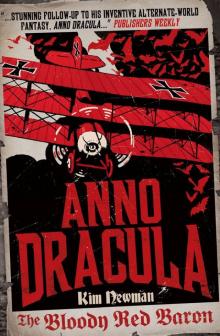 The Bloody Red Baron
The Bloody Red Baron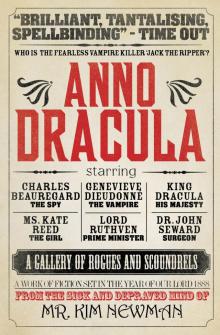 Anno Dracula
Anno Dracula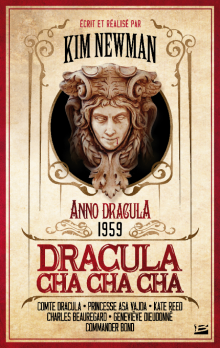 Dracula Cha Cha Cha
Dracula Cha Cha Cha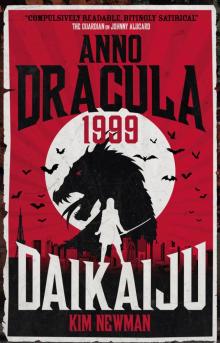 Anno Dracula 1999
Anno Dracula 1999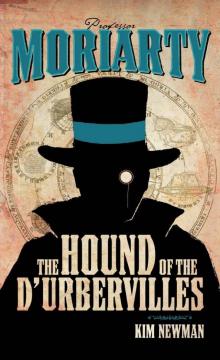 Moriarty: The Hound of the D'Urbervilles
Moriarty: The Hound of the D'Urbervilles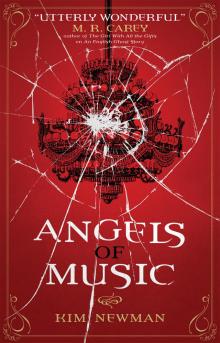 Angels of Music
Angels of Music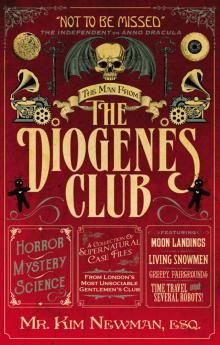 The Man From the Diogenes Club
The Man From the Diogenes Club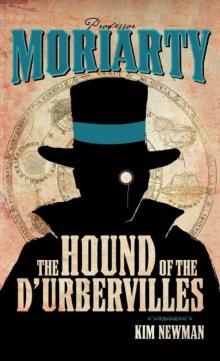 Professor Moriarty: The Hound Of The D’urbervilles
Professor Moriarty: The Hound Of The D’urbervilles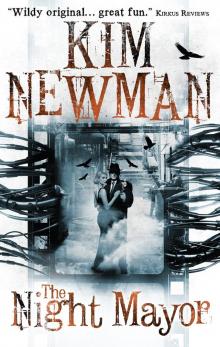 The Night Mayor
The Night Mayor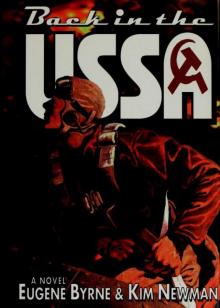 Back in the USSA
Back in the USSA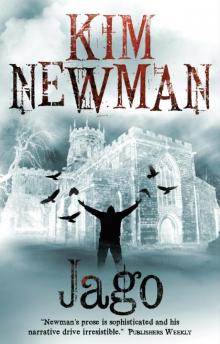 Jago
Jago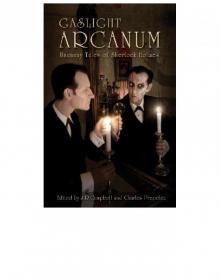 Gaslight Arcanum: Uncanny Tales of Sherlock Holmes
Gaslight Arcanum: Uncanny Tales of Sherlock Holmes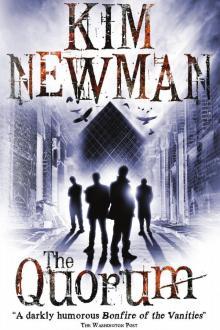 The Quorum
The Quorum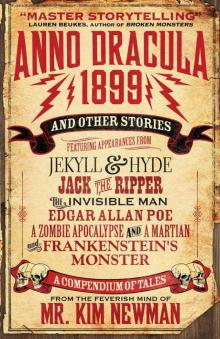 Anno Dracula 1899 and Other Stories
Anno Dracula 1899 and Other Stories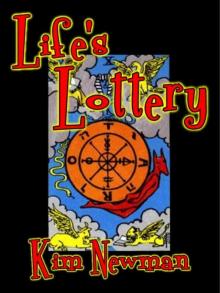 Life's Lottery
Life's Lottery The Secrets of Drearcliff Grange School
The Secrets of Drearcliff Grange School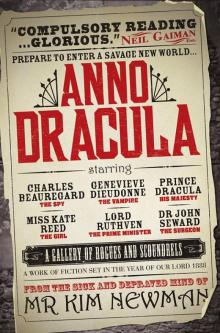 Anno Dracula ad-1
Anno Dracula ad-1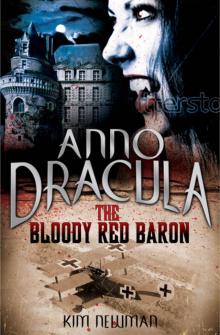 The Bloody Red Baron: 1918 ad-2
The Bloody Red Baron: 1918 ad-2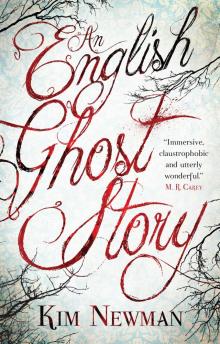 An English Ghost Story
An English Ghost Story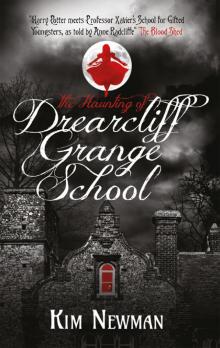 The Haunting of Drearcliff Grange School
The Haunting of Drearcliff Grange School The Other Side of Midnight
The Other Side of Midnight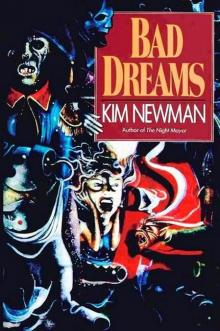 Bad Dreams
Bad Dreams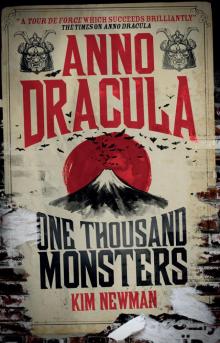 Anno Dracula--One Thousand Monsters
Anno Dracula--One Thousand Monsters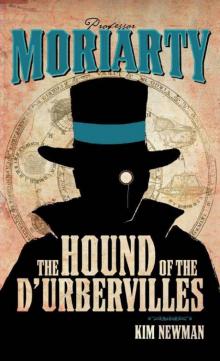 The Hound Of The D’urbervilles
The Hound Of The D’urbervilles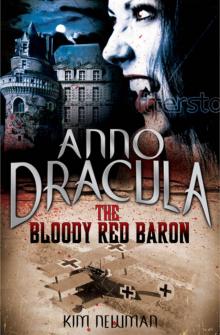 The Bloody Red Baron: Anno Dracula 1918
The Bloody Red Baron: Anno Dracula 1918